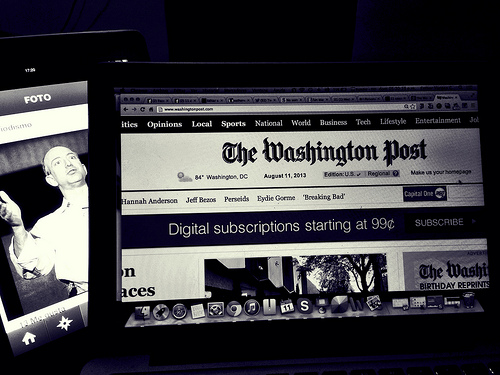
Aaron Kushner
Published earlier at The Huffington Post.
If you’re going to make an audacious bet on the future of newspapers, as Aaron Kushner did with the Orange County Register, then it stands to reason that you should have enough money in the bank to be able to wait and see how it plays out.
Kushner, unfortunately, is now slashing costs at his newspapers almost as quickly as he built them up. On Tuesday, Kushner announced that Register employees would be required to take unpaid two-week furloughs during June and July. Other cuts were announced as well. The most significant: buyouts for up to 100 employees; and one of Kushner’s startup dailies, the Long Beach Register, will more or less be folded into another, the Los Angeles Register.
Those cuts follow the elimination of some 70 jobs at the OC Register and the Press-Enterprise of Riverside in January — cuts that came not long after a year when Kushner’s papers, in a celebrated hiring spree, added 170 jobs.
Is it time to push the panic button? The estimable Ken Doctor, writing for the Nieman Journalism Lab, says yes, arguing that the latest round of cuts raise “new questions about its very viability in the year ahead.” Doctor may be right. But as I wrote at The Huffington Post earlier this year, I hope Doctor is wrong, given the promise of Kushner’s early moves.
In 2013 Kushner and his business partner, Eric Spitz, were the toast of the newspaper industry. In the Columbia Journalism Review, Ryan Chittum hailed their print-centric approach and hypothesized that being able to scoop up the Register debt-free might enable them to succeed where others — including Tribune Co. and the Journal Register Co. — had failed. “Kushner,” Chittum wrote, “had the benefit of buying Register parent Freedom Communications out of bankruptcy — after newspaper valuations had already fallen 90 percent in some cases.”
Spitz, in a cocksure interview last October with Lauren Indvik of Mashable, mocked his competitors for giving their journalism away online, insisting that he and Kushner had a better idea.
“The key decisions they made — and they were the worst decisions anyone has made in my memory — they made 20 years or so ago. They took their core product, the news, and priced it at free,” Spitz told Indvik, adding: “I think 20 years later the amount of revenue you can derive from advertising is less than they thought. But the bigger problem they created is telling your customer that your product has no value.”
Unfortunately for Spitz and Kushner, there are few signs that their strategy of pumping up their print editions (even improving the paper stock) while walling off their digital content behind relatively inflexible paywalls has paid off.
According to the Alliance for Audited Media, paid circulation at the Orange County Register for the six months ending Sept. 30, 2011, before Kushner and Spitz took charge, averaged 283,997 on Sundays and 172,942 Monday through Saturday. The sale took place in July 2012. That September, paid circulation actually rose, to 301,576 on Sundays and 175,851 the rest of the week. But in September 2013 it dropped below pre-Kushner levels, to 274,737 on Sundays and 162,894 the other six days. (I am excluding what AAM refers to as “branded editions” — mainly regional weeklies published by the Register. The numbers combine print and paid digital circulation, which, in the case of the Register, is negligible.)
Kushner is a Boston-area native who made his money in the greeting-card business. Before his move to Southern California, he tried to buy The Boston Globe and, later, nearly closed a deal to purchase the Portland Press Herald of Maine. So it’s interesting to note that Red Sox principal owner John Henry, who eventually won the sweepstakes for the Globe, has taken a very different approach from Kushner, sinking money into an online-only vertical covering innovation and technology as well as repositioning the paper’s venerable free Boston.com site as a “younger, voicier, edgier” complement to the Globe. Soon the Globe is expected to unveil an ambitious website covering the Catholic Church in the hopes of attracting a national and international audience.
Perhaps the most important difference between Henry and Kushner, though, is the depth of their pockets. There are limits to Kushner’s wealth, and those limits are becoming apparent as he attempts to make his newspaper mini-empire profitable. Henry, a billionaire investor, can afford to take the long view. In that respect, he is more like Amazon.com founder Jeff Bezos, who announced that he would buy the Washington Post just days after Henry said he would acquire the Globe.
Ryan Chittum, in his CJR piece, called Kushner’s approach “the most interesting — and important — experiment in journalism right now.” It would be easy and facile to make too much of Kushner’s woes. He may simply have gotten ahead of himself, and is now buying the time he needs to make sense of what he is building. Then again, if Ken Doctor is right, the end of this particular newspaper story may be in sight.







